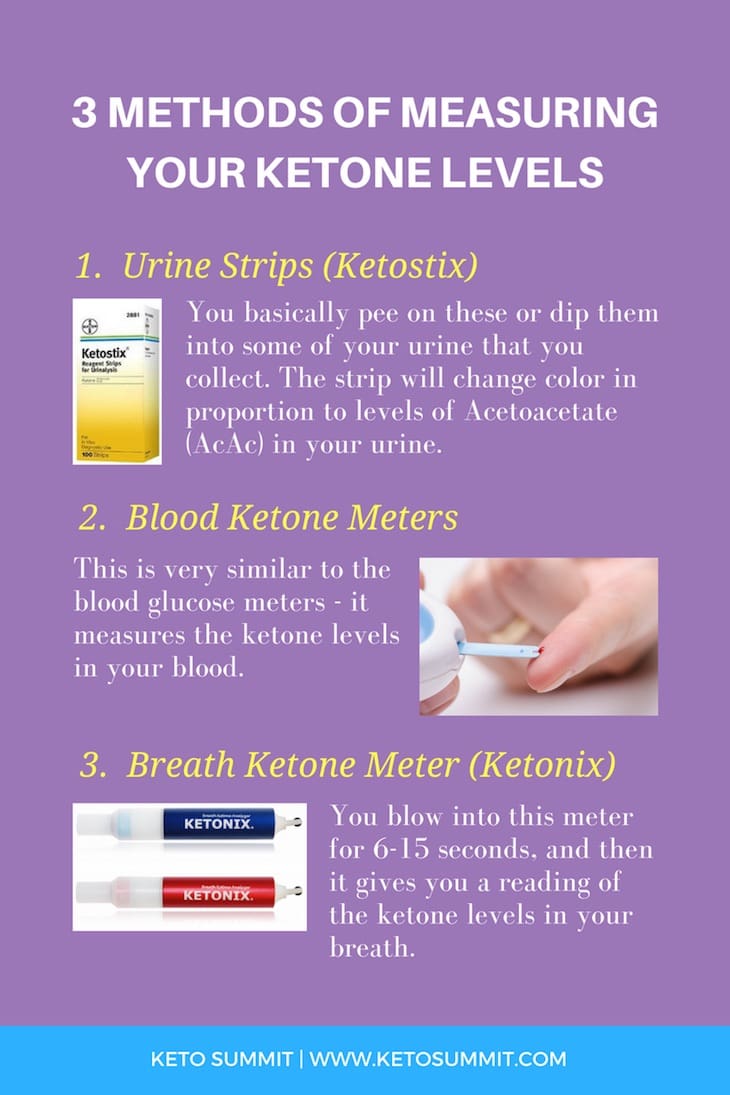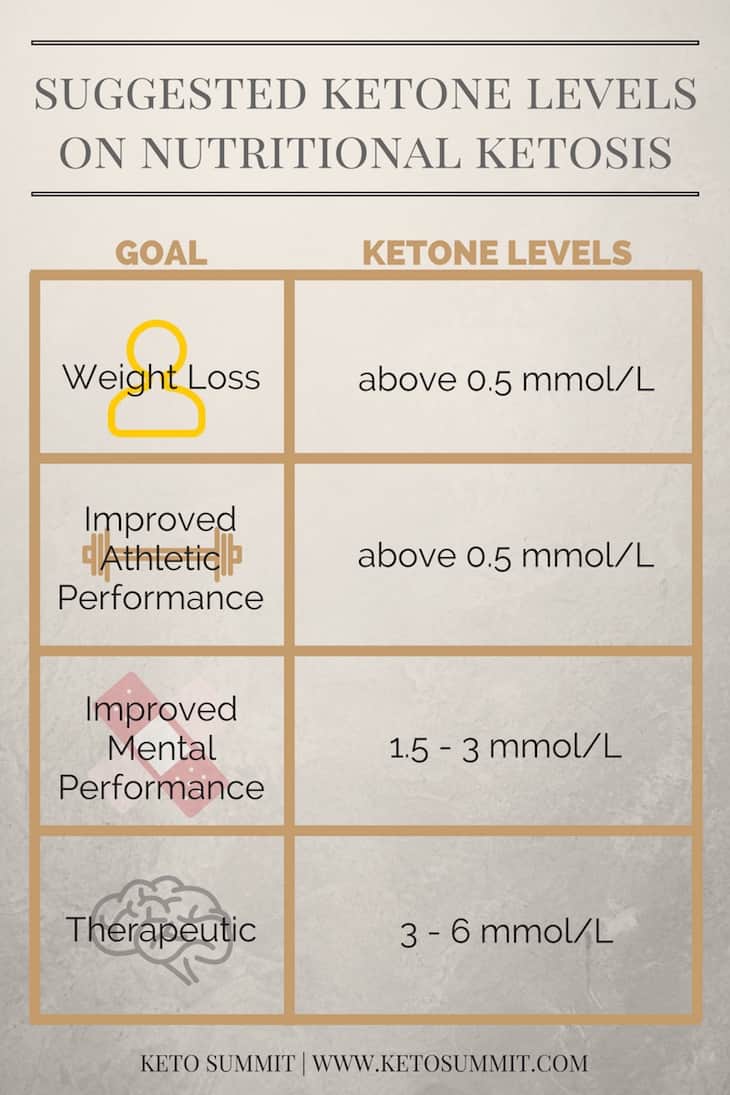What Are The Optimal Ketone Levels For A Ketogenic Diet? (+ How to Do A Ketone Blood Test)

If you’ve just started a ketogenic diet, then you’ll know that it can be really tough to figure out if you’re doing keto right.
Am I eating too many carbs? Too much protein? Should I still be feeling tired? When is the fat burning supposed to start?
It’s confusing, and one of the most confusing aspects is what your optimal ketone levels are supposed to be.
Unlike most other diets, the ketogenic diet is designed to put your body into a state of ketosis in order to get your body to start burning ketones instead of the glucose that it usually burns when you eat a high carb standard American diet (SAD).
But to know whether you’re in ketosis and whether your body has enough ketones circulating for you to use as energy instead of glucose, you have to measure your actual ketone levels and then determine whether they’re high enough for you to be reaping the benefits of the ketogenic diet.
If you’ve tried searching for this information already, then you’ll know that there’s some controversy depending on which expert you follow. So in this article, we’ll tell you exactly what the different experts are suggesting are the optimal ketone levels as well as give you recommendations for what levels you should be aiming for depending on your goals with a ketogenic diet.
A Few Quick Notes Before We Start…
- If you’re looking for signs other than testing your actual body ketone levels as to whether you’re in ketosis or not, then please check out this article instead that provides you with signs you’re in ketosis.
- If you’re a type 1 diabetic, then this article is not for you and the optimal levels suggested below are not applicable to you. Please check out the tons of other ketone level articles on the web to ensure your ketone levels do not reach dangerous levels.
- And lastly, while the levels of ketones in your body is important, it’s not all that you should be thinking or worrying about. For example, while you may be able to raise your levels by taking exogenous ketone supplements like KETO//OS®, this artificially induced higher ketone levels may not offer the same benefits as when you produce your own. As Marty Kendall put it:
“The real ketone magic…[occurs when] we deplete glucose [and] we train our body to produce ketones.”
Table of Contents for What Are The Optimal Ketone Levels For A Ketogenic Diet?
This is a comprehensive article but if you want to jump to a specific section, just use the table of contents below to do so.
- What are ketones?
- How to measure ketones (and do you need to measure them)?
- How to interpret your ketone results?
- What’s the optimal ketone level for your ketogenic diet?
- Conclusion – Table of Optimal Ketone Levels
What are ketones?
You’ve probably already figured out that on the ketogenic diet you burn fat in the form of ketones. But what are these magical ketones that your body can use for fuel while helping you lose weight, think clearer, and reduce inflammation?
Technically, ketones are a group of water-soluble organic molecules with a very specific chemical structure. However, when people talk about ketones for nutritional ketosis purposes on the ketogenic diet, they’re usually referring to a few specific ketones produced by our body as fuel (and these are technically called ketone bodies).
Our body produces 3 different ketone bodies (and for ease we’ll just call them ketones):
Acetoacetate (AcAc) – found mostly in your urine

Beta-hydroxybutyrate (BHB) – found mostly in your blood
It’s technically not a ketone because it has a different chemical structure, but it’s commonly referred to as one.
Acetone – found mostly in your breath

And when we talk about measuring ketone levels, we’re typically talking about measuring levels of one of these three. That’s why there are 3 types of meters you can purchase – one for measuring ketones in your urine, one for measuring the level of ketones in your body, and one for measuring ketones in your breath.
Another definition that’s really helpful to know about these ketones is the difference between endogenous and exogenous ketones…
The ketones that are produced naturally by your body are called “Endogenous” ketones. However, you can also take ketone supplements to raise your body’s ketone levels artificially and those ketones supplements are called “Exogenous” ketones.
There’s a lot of debate as to the health and weight-loss benefits of these exogenous ketone supplements right now, so for purposes of this article, the optimal ketone levels suggested are for endogenous ketones – i.e., you produced them yourself rather than relying on supplements.
How to measure ketones (and do you need to measure them)?
Your blood ketone levels are generally considered to provide the most accurate reading of your body’s levels and therefore the best indicator of ketosis (but measuring blood ketone levels is also the most expensive method). That’s why many people measure their urine and breath ketone levels instead.
Here are the 3 methods of measuring your ketone levels:

1. Urine Strips (Ketostix). You basically pee on these or dip them into some of your urine that you collect. The strip will change color in proportion to levels of Acetoacetate (AcAc) in your urine. If you’re just getting started on a ketogenic diet, then these reasonably cheap strips can offer you a quick and easy indicator of if your ketogenic diet is going in the right direction.
2. Blood Ketone Meters (along with ketone measuring strips). This is very similar to the blood glucose meters (and in fact, they also work as a blood glucose meter if you buy the glucose measuring strips) – you prick your finger with a lancet and then use the ketone measuring strips connected to the blood ketone meter to soak up a small drop of blood. The blood ketone meter will then do its thing and give you a blood ketone level reading. The main problem with these is that the ketone measuring strips are super expensive (around $3-4 per strip). Update: Keto Mojo released their meter and strips after this post was written. Their strip prices are around $1, making it much cheaper to do a keto blood test now.
3. Breath Ketone Meter (Ketonix). This is a reusable meter that measures ketones in your breath. There’s no prick to draw blood, it charges through a USB plug, and no strips are required. You warm up the meter for a few minutes, blow into the meter for 6-15 seconds, and then it gives you a reading.
Additional Method of Determining Your Ketone Levels without Ketone Meters
As Marty Kendall has pointed out, there is a clear link between your blood glucose levels and blood ketone levels. As your blood glucose levels decrease, your blood ketone levels will increase. However, the exact relationship between these two varies from person to person so you won’t be able to have an exact ketone measurement based on your glucose measurement. But by taking your blood glucose measurements, you can get a good indicator of what your ketone levels might be.
Do you really need to measure your ketone levels on a ketogenic diet?
We know all that all this testing equipment is expensive as well as a hassle to use. So, do you really need it?
The simple answer is no, you definitely don’t need to know your exact ketone levels in order to enjoy the benefits of a ketogenic diet. And some people like Luis from Ketogains suggests not bothering to measure at all except in a few specific circumstances.
However, others raise the importance of measuring ketones especially when you first start the diet – different people will require different levels of carbohydrates and proteins in order to get into nutritional ketosis and knowing how your levels change over time will give you a good idea of whether you’re on the right track or if you need to tweak what you’re eating.
Tracking your ketone levels can also be important for troubleshooting your keto diet – e.g., if your weight-loss stalls.
But regardless, don’t obsess about your ketone levels – knowing your levels is supposed to help you tweak your keto diet, not stress you out!
How to interpret your ketone results?
All 3 methods of measuring ketones are pretty easy to use and come with instructions as to what your results may mean and in the next section, we’ve found what the experts consider to be “optimal” levels. However, 2 problems typically arise when you measure your ketone levels:
What units are my ketone results in?
The first issue is that different meters/sticks from different countries will sometimes provide your results in different units. It’s sort of like someone telling you the temperature in degrees Celsius (C) when you only know temperatures in degree Fahrenheit (F).
When doing a keto blood test, most people measure using millimol per liter (mmol/L) as the unit of measurement but on some meters and ketone strips, you might see milligram per deciliter (mg/dL) instead. All you need to know is that if your blood ketone results are in mg/dL then you can convert them to the typical mmol/L by dividing by 10.4 (thank you to one of our readers for pointing out the previous mistake here – please note this conversion is for ketones, not glucose, which is why the conversion number is NOT 18).
Convert Ketones mmol/L to mg/dL:
A lot of people have emailed confused about this, so let me pull out my chemistry knowledge and try to resolve this question once and for all.
For Acetone, the molecular mass is: 58 g/mol
For Beta-hydroxybutyrate, the molecular mass is: 104 g/mol
The rest is just fiddling around with decimal points to get all the units in order.
That’s why for Acetone, the conversion factor (CF) is: 5.8 (or the reverse is 0.17)
So for concentrations of Acetone ketone bodies, 1 mmol/L = 5.8 mg/dL or 1 mg/dL = 0.17
And for Beta-hydroxybutyrate, the conversion factor (CF) is: 0.096 (or the reverse is 10.4)
So for concentrations of Beta-hydroxybutyrate ketones, 1 mmol/L = 10.4 mg/dL or 1 mg/dL = 0.096
Hope this gets rid of all the confusion around converting concentrations of ketones around.
Should I be Converting Acetone or Beta-hydroxybutyrate For My Ketone Levels?
Most of the online converters I’ve seen are converting acetone levels. And if you’re peeing on the urine ketone sticks, then you’re measuring your acetone ketone levels in urine.
As I explain below, this is NOT very accurate at all. If you drink more water, then your urine ketone concentrations will go down.
That’s why all the ketone levels that experts tell you about are blood ketone concentrations (measurements of beta-hydroxybutyrate). So, when they say you should have a ketone reading of 1, they’re talking about your blood ketone measurements made using a blood ketone meter.
You cannot convert your urine ketone levels to your blood ketone levels.
So, use the urine ketosis sticks for some basic knowledge of your ketone levels, but use the blood ketone meter if you really want to know your ketone levels.
How accurate is my ketone meter or stick?
Your blood ketone meter will give you more precise readings than a rough color change on your Ketostix.
But, what people mean when they say measuring ketone in your urine (or using Ketostix) is inaccurate is that knowing how much ketones you have in your urine doesn’t tell you much. Your Ketostix could be pink even if you’re in deep ketosis.
Also, the urine sticks (like Ketostix) only measure acetoacetate levels and those found in your urine are the excess acetoacetate that’s excreted. So, it’s not a good indicator of how much there is in your cells ready to be used for energy.
Again, the advice here is simply to not obsess about your ketone levels.
What’s the optimal ketone level for your ketogenic diet?
As you might have suspected, there isn’t a one-size fits all answer to this question. Part of the answer depends on what your goals are.
The optimal ketone levels you’ll want to achieve will likely be different depending on whether you’re looking to lose weight, get improved mental clarity, improve your athletics performance, or to cure/prevent illnesses like cancer. And the numbers may also vary depending on your body’s current insulin resistance (e.g., if you have type 2 diabetes or if you’re pre-diabetic then your optimal levels at the beginning may also differ from someone who has healthy levels of blood glucose).
Bearing all of those different factors in mind, below are some ranges proposed by different ketogenic diet experts and below that you’ll see a table of our suggestions based on those expert’s opinions.
NOTE – again, these ketone levels are for optimal nutritional ketosis and should not be used if you’re a type 1 diabetic!
Jeff Volek and Stephen Phinney

Most people have based their optimal ketone numbers on the recommendations in The Art and Science of Low Carbohydrate Performance: “‘light nutritional ketosis’ is between 0.5mmol/L and 1.0mmol/L and ‘optimal ketosis’ is between 1.0mmol/L and 3.0mmol/L.”
Dr. Thomas Seyfried

Dr. Thomas Seyfried, a professor of biology at Boston College who researches cancer and the uses of a ketogenic diet in curing and preventing cancer, states in the The Complete Guide to Fasting book: “The key to therapy is prolonged therapeutic ketosis (blood ketones in the range of 3–6mM), together with reduced blood glucose levels (3–4 mM).”
Dominic D’Agostino

Dominic D’Agostino is an assistant professor in University of South Florida and his lab researches how a ketogenic diet can aid neurological diseases. In a 2014 podcast with Chris Kelly from Nourish Balance Thrive, Dominic stated: “What’s the optimal level of ketones? I think anecdotally and from the data that I’ve seen, I think somewhere between 1.5 and 3 is optimal.”
Luis Villasenor

Luis from Ketogains.com who helps many bodybuilders on a ketogenic diet has repeatedly suggested that search for high ketone levels is not always beneficial. He regularly tells people: “don’t chase ketones; chase results.”
Marty Kendall

Marty, an engineer who runs the website and Facebook group, Optimising Nutrition, states that: “If your aim is exercise performance or fat loss then ketones between 0.5mmol/L and 1.3mmol/L might be all you need to aim for. I also think loading up on dietary fat at the expense of getting adequate protein, vitamins and minerals may be counterproductive in the long term.”
Marty also points out that not everyone on a ketogenic diet will get high levels – for example, Sami Inkenen only had around 0.6mmol/L when he was rowing from the US to Hawaii on an 80% fat diet.
Tommy Wood
We asked Tommy Wood, the chief medical director at Nourish Balance Thrive, for his thoughts as he co-hosted the Keto Summit with us. This is what he wrote:
“If you’re looking for therapeutic ketosis for cancer (especially) or a neurological disease, I would go towards Seyfried’s target range. Plus a target GKI of 1, or at least <2.
For anybody looking for weight loss or athletic performance, I think Marty’s last point and Luis Villasenor’s view are what I’d side with. You want a healthy ketone-based metabolism, but the absolute numbers don’t really matter that much, in my opinion.
Your absolute ketone levels tell you nothing about how well you are a) making ketones b) using ketones, or c) retaining ketones (i.e. preventing wasting via the urine). The number you measure is just a balance of all three. So you could be running purely on ketones but using everything you make, and end up with “low” levels – Sami Inkenen is a good example.
There’s no such thing as an optimal recommendation for everyone because we just don’t know how to measure or understand all those processes as much as we’d like to think we do!”
Conclusion – Table of Optimal Ketone Levels
Based on the current expert opinions, below is a table of what you might want to see your ketone levels at depending on what your goals are.

Weight-loss: above 0.5mmol/L
Improved athletic performance: above 0.5mmol/L
Improved mental performance: 1.5-3mmol/L
Therapeutic (e.g., to prevent or cure certain illnesses): 3-6mmol/L
Again, these are general ranges and if yours doesn’t fall within the range, it’s not a definitive indicator that you’re doing something wrong, but it is a helpful guide to ensure you think about tweaking and testing your keto diet to see if something can be improved.
